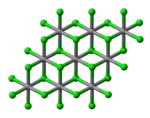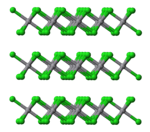Vanadium(II) chloride
| |||
| Names | |||
|---|---|---|---|
| IUPAC name
Vanadium(II) chloride | |||
| Other names
Vanadous chloride | |||
| Identifiers | |||
| 3D model (JSmol) |
|||
| ChemSpider | |||
| ECHA InfoCard | 100.031.057 | ||
| PubChem CID |
|||
| RTECS number | YW1575000 | ||
| |||
| |||
| Properties | |||
| VCl2 | |||
| Molar mass | 121.847 g/mol | ||
| Appearance | pale green solid | ||
| Density | 3.230 g/cm3 | ||
| Melting point | 1,027 °C (1,881 °F; 1,300 K) | ||
| Boiling point | 1,506 °C (2,743 °F; 1,779 K) | ||
| soluble | |||
| +2410.0·10−6 cm3/mol | |||
| Structure | |||
| CdI2 | |||
| octahedral | |||
| Hazards | |||
| Main hazards | Reacts with oxygen rapidly | ||
| R-phrases (outdated) | 20/21/22-34 | ||
| S-phrases (outdated) | 26-27-36/37/39-45 | ||
| Related compounds | |||
| Other anions |
vanadium(II) fluoride, vanadium(II) bromide, vanadium(II) iodide | ||
| Other cations |
titanium(II) chloride, chromium(II) chloride | ||
| Related compounds |
vanadium(III) chloride | ||
| Except where otherwise noted, data are given for materials in their standard state (at 25 °C [77 °F], 100 kPa). | |||
| | |||
| Infobox references | |||
Vanadium(II) chloride is the inorganic compound with the formula VCl2, and is the most reduced vanadium chloride. Vanadium(II) chloride is an apple-green solid that dissolves in water to give purple solutions.[1]
Preparation, properties, and related compounds
Solid VCl2 is prepared by thermal decomposition of VCl3, which leaves a residue of VCl2:[1]
- 2 VCl3 → VCl2 + VCl4
VCl2 dissolves in water to give the purple hexaaquo ion [V(H2O)6]2+. Evaporation of such solutions produces crystals of [V(H2O)6]Cl2.[2]
Structure
Solid VCl2 adopts the cadmium iodide structure, featuring octahedral coordination geometry. VBr2 and VI2 are structurally and chemically similar to the dichloride. All have the d3 configuration, with a quartet ground state, akin to Cr(III).[3]
Vanadium dichloride is a powerful reducing species, being able to convert sulfoxides to sulfides, organic azides to amines, as well as reductively coupling some alkyl halides.
References
- 1 2 Young, R. C.; Smith, M. E. "Vanadium(II) Chloride" Inorganic Syntheses, 1953, volume IV, page 126-127.doi:10.1002/9780470132357.ch42
- ↑ Martin Pomerantz, Gerald L. Combs, N. L. Dassanayake, "Vanadium Dichloride Solution" Inorganic Syntheses, 1982, vol. XXI, pp. 185–187. doi:10.1002/9780470132524.ch42
- ↑ Holleman, A. F.; Wiberg, E. "Inorganic Chemistry" Academic Press: San Diego, 2001. ISBN 0-12-352651-5.

